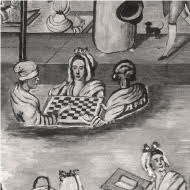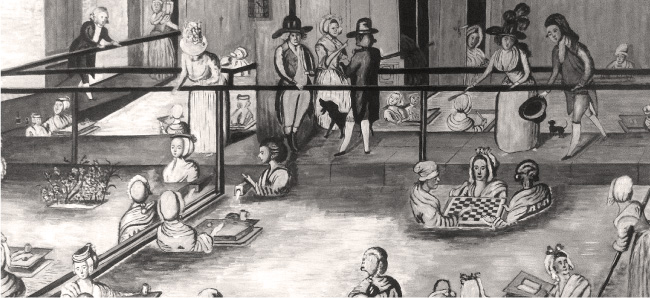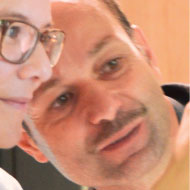
The hotel's post
Back to the source - History of Leukerbad’s Sources
Published on Jun 4th 2015
Already popular among the Romans for its sources with therapeutic and invigorating properties, it is only in the 14th century that Leukerbad, then called "Boez", becomes an indipendent commune whose reputation will be defined by these springs. Today, with its 3.9 million liters of water gushing from the ground daily, it is the largest Thermalism- and Wellness resort in Europe.

700 Years of Thermalism
The history and the development of Leukerbad are closely linked to its sources. The oldest document in the city archive dates back to 1315 and specifically mentions the thermal baths and a path that leads there - "via, qua itur ad balnea". Leukerbad was only a small village then and it took centuries to see first developments in infrastructure.
In 1501 the village saw the first arrival of tourists, triggered by Bishop Matthew Schiner, the rights owner to the baths at the time. He invested in the baths and spread the word about the town far beyond its borders, praising its thermal cures on his polical travels throughout Europe.
The rights to the thermal springs frequently changed hands before they became Leukerbad’s property in1682.
But it is only since the 19th century that the town gained importance, through the construction of access roads and other facilities which worked hand in hand to support the development of the hospitality and tourism industries. Nowadays Leukerbad is one of the most recognized wellness centers.
Thermal Springs, Mountain Treasures
Leukerbad has 65 springs registered in its land registry - 8 of which are currently used for therapeutic or revitalizing purposes. These natural resources have contributed their share to promote tourism and to shape the station’s reputation. So what are the characteristics and where do the beneficial effects of thermal waters come from?
A thermal source is defined as a source that springs from ground water and emerges from the rock with at least 20 degrees Celcius. It involves water outlets, hot or cold, whose temperature may be up to 51 degrees, such as is the case of the St. Lorenz spring.
This precious resource is the result of an over 40 year journey through underground flow paths. The water begins its journey to the east of the village, between the Majing- and Torrenthorn, at the level of lake Wyss and lake Schwarz. At an altitude of approximately 3000 meters, rainwater enters the mountain through a network of cracks and fissures and sinks to a depth of 500 meters below sea level. During this trip through the rock, the water accumulates many minerals such as calcium, sodium, iron and fluorine. And then, as thermal water, it rises to re-surface as one of the many sources of Leukerbad.
N.B. The Hotel Le Bristol has its own thermal spring, whose waters exit at "Baronmatte" a site 1,360 m above sea level, with a temperature of 31 ° C. It is dedicated exclusively to hotel guests.
The Healing Effects of Thermal Water
Thermalism has always been popular, be it for its medicinal properties, for its detoxing effects or to counter the stress we face today.
Thermal water has a stimulating effect on the body. Its heat relaxes muscles and improves the elasticity of the joints, which leads to a relief of osteoarthritis. The calcium sulfate contained in the Leukerbad’s thermal waters is absorbed by the skin and alleviates rheumatic and neurological ailments.
The water also has a considerably positive effect on the psyche. With its relaxing and revitalising properties, it helps fight modern, stress related ills.
As a veritable source of alpine energy for body and soul, the thermal waters will never stop doing us good.
(MG)

The hotel's post
Independent and even closer to its guests
Published on May 1st 2015
The hotel Le Bristol is no longer part of the Accor Group. After seven years it went back to its original name in April and will be managed independently from now on. The hotel’s Manager Stefan Röösli and his team are staying on—guests will encounter familiar faces when they return. In an interview the host tells us what he has in mind to make the Le Bristol even better.

Stefan Röösli and the photographer Myriam Ramel during the photo-shoot for the hotel’s new look.
Myriam Ramel / www.lumieredujour.ch
Stefan Röösli, the hotel Le Bristol is no longer a member of the Accor Group. What does that entail for returning guests, some of which have known the hotel for a long time?
The move is not intended to change things drastically. Our regular guests will notice the hotel’s new name, visit a new website and, when they come and stay with us, will experience the refreshed look. They will feel as comfortable as they did in all the years before.
How will you ensure that?
We didn’t have to change much to the hotel. Le Bristol’s spacious and modern rooms, its spa with indoor and outdoor pools, and the good food we serve speak for themselves. What’s crucial to the guests are the employees. I am very fortunate to have been able to keep on our team. Many of our employees have been working at the Le Bristol for many years. They are the ones that ensure the guests enjoy our excellent service and our authentic hospitality.
Will you be making any significant changes to what’s on offer and the tariffs?
Our guests will get an even wider choice. The prices will remain pretty much the same; the price structure will have a finer seasonal variability. We will be putting more emphasis on marketing our very attractive two to seven day packages that include dinner and spa treatments. The new room prices will all include breakfast, free wireless internet, and, it goes without saying, access to the hotel’s spa and wellness area, which is Leukerbad’s largest private spa. I am particularly proud of our own thermal spring, supplying thermal water uninterruptedly—it has a high content in minerals and a temperature of 33 degrees.
Which type of guest is the hotel’s offer tailored to?
Our key audience are active people of the baby boomer generation, who lead a health-conscious life without giving up on enjoyment. They recharge their batteries at this alpine source of energy that is the Le Bristol and the unique natural site of Leukerbad. We have many families visiting, especially on weekends, and during the week we also have guests taking part in company events.
You are speaking of the Le Bristol’s conference facilities?
Not just that. We offer large conference rooms for up to 80 people and also small and mid-size rooms ideally suited for workshops. Conference participants, however, very much appreciate to be able to go for a walk or take advantage of the many options to do outdoor sports, to relax in our spa, or spend a pleasant evening in our rustic Carnotzet.
How are the guests reacting to Le Bristol’s new identity?
The reactions are generally positive. Our team and our hospitality are the keys to our guests’ satisfaction.
Why this move to independence?
Being a member of a world-wide group has its advantages in terms of marketing, but, today, a hotel geared towards holiday-makers needs to be flexible able to adapt quickly to the needs of its guests or the changing market environment. We can do that better as an independent hotel.
How do you market yourself?
Our excellent national and international relationships with tour operators, online travel agents and the large stock of addresses of existing and potential guests are real assets for our own marketing activities. We also work closely with both Leukerbad Tourism and Switzerland Tourism. As part of the relaunch of the «Le Bristol» we have put in place a new website, are present on social media, and are continuously working towards improving our image and to extend our reach in media communications.
Having totally renewed the spa in 2008 and completed the refurbishment of the rooms in 2013, the hotel is now modernised and up to date. Where will you be investing next?
Our owners, a family trust opting to remain in the background, are committed to the hotel for the long term and are investing continually. As is often the case in the hospitality industry, many things take place in the background, so the guests will not take notice of it. For example, when we overhaul the hotel’s technical infrastructure or its safety installations, and it is also true of the continuous maintenance work in the rooms and public areas.
What are you looking forward to most this summer?
Many and diverse events will take place this summer, as always. The Swiss chess championships, the live broadcasts of the «Donnschtig Jass» and the «Schlager Welle», the Shepherds’ festival on the Gemmi, and the spectacular Swiss Epic mountain bike race offer a wide array of events. The 20th literature festival from the 3rd to the 5th of July, with readings by authors in our hotel, will be a special treat, to which I am very much looking forward to. The opening of the «Fussbadquelle» on the 13th of June will also be very exciting—it being the first spring accessible to visitors.
(Interview: Christian Gartmann)





